|
|
|
Sort Order |
|
|
|
Items / Page
|
|
|
|
|
|
|
| Srl | Item |
| 1 |
ID:
181338
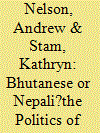

|
|
|
|
|
| Summary/Abstract |
For the group of Nepali-speaking refugees who fled Bhutan in the early 1990s, there exists no consensus ethnonym, but rather multiple terms—‘Nepali’, ‘Bhutanese’ and ‘Lhotshampa’. Based on a mixed methods approach, this article addresses the politics of ethnonym ambiguity by contextualising current naming practices within the group’s legacy of displacement as migrants in Bhutan and refugees in Nepal. In resettlement in the United States, refugees translate this legacy into strategic identification with both Bhutan and Nepal as a form of negotiation with new contexts of ambiguity conditioned by the politics of ‘deserving-ness’, racialisation and diaspora.
|
|
|
|
|
|
|
|
|
|
|
|
|
|
|
|
| 2 |
ID:
181331
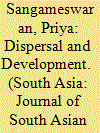

|
|
|
|
|
| Summary/Abstract |
This paper attempts to understand the development of Thane, a suburban city of Mumbai, by focusing on two moments, nearly a century apart, that contributed to its identity in formative ways. The first is the introduction of the first railway passenger train service in India between Bombay and Thane in 1853, and the second is the setting up of the first industrial estate in the state of Maharashtra in Thane in 1961. Despite spanning different periods and actors, the two moments share the same theme: dispersal from Bombay, of people in the first case and industries in the second, which resulted in Thane acquiring the status of first a suburb, and then an industrial city. These identities involve a certain degree of functionality in terms of Thane’s relationship with the larger metropolis of Mumbai, but simultaneously also give a distinct character to Thane’s trajectory of development.
|
|
|
|
|
|
|
|
|
|
|
|
|
|
|
|
| 3 |
ID:
181339
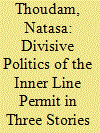

|
|
|
|
|
| Summary/Abstract |
In the context of the Citizenship (Amendment) Act, 2019, and the National Register of Citizens in Assam, this paper interrogates the xenophobic dimensions of Meitei nationalism that translated into a demand for the implementation of the Inner Line Permit (ILP) regime in Manipur in India’s Northeast. The ILP was extended to Manipur in 2019, regulating the entry of ‘outsiders’. Moreover, the recent pandemic has also visibilised the figure of a migrant worker. This paper, however, goes back several years earlier to examine literary representations of the anti-migrant ILP demand. It also highlights its gendered aspect by looking at three texts by ‘dominant’ Meitei women: Ngaseppam Nalini (Nee) Devi’s ‘Mukti’ (2002), Huirongbam Benubala’s ‘Blockade’ (2000) and Kshetrimayum Subadani’s ‘The Heat and the Agony’ (2007). Drawing on theorisations by Anne McClintock and Rosemary Marangoly George, and focussing on the figure of the migrant worker, these stories open up the question of belonging beyond the scope of the nation.
|
|
|
|
|
|
|
|
|
|
|
|
|
|
|
|
| 4 |
ID:
181337
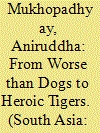

|
|
|
|
|
| Summary/Abstract |
Dalit autobiographies narrate the journey of protagonists from the ‘untouchable’ communities of India towards self-realisation and their struggle for human rights. A vigilant reading recognises the representation of animals as tropes in Dalit autobiographies that trace the reconstitution of the non-human limit of the Dalit as narrative subject. This paper reads Dalit autobiographies by Narendra Jadhav, Bama and Namdeo Nimgade to reveal the importance of animals as an analogy in Dalit literature, but then, following the work of Spivak and Derrida, it deconstructs the circulation of the hegemonic logic of the rational humanist subject in the radical gesture of Dalit subject constitution.
|
|
|
|
|
|
|
|
|
|
|
|
|
|
|
|
| 5 |
ID:
181336
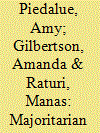

|
|
|
|
|
| Summary/Abstract |
This paper explores media coverage of instant ‘triple talaq’—a form of divorce practised by some Indian Muslims—and ‘love jihad’—a supposed trend of Muslim men coercing Hindu women into conversion and marriage. The Hindu Right position itself as champions of gender justice in the context of outlawing instant triple talaq, but in discussions of ‘love jihad’ sideline women’s rights (to choose their own religion and spouse) and focus on national security. This reveals the strategic use of women’s rights by the Hindu Right to further entrench its imagination of a secular Hindu nation threatened by the Muslim man.
|
|
|
|
|
|
|
|
|
|
|
|
|
|
|
|
| 6 |
ID:
181333
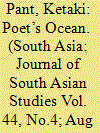

|
|
|
|
|
| Summary/Abstract |
This essay explores an unusual vernacular source of poetic writings by Asim Randeri (1904–2009), a Muslim poet from a merchant family of Gujarat, in order to understand how the imagination—particularly when engaged through poetry and piety—became a charged realm in which Indian Muslims responded to British colonial pressure on them, expressing the itinerancy at the heart of mercantile life that separated individuals from their families, port city and wider community. Recent scholarship has focused on the economic pursuits of Gujarati merchants in port cities across the Indian Ocean in the nineteenth and twentieth centuries and even earlier. This article shifts the analysis to their diasporic imagination, as a correlate of itinerant commerce. Through this essay, I reflect on the many temporalities and internal social dynamics at play in the mercantile imaginations that emerge from Gujarati trader communities. These, I demonstrate, provide a sharp contrast to the short-term framing emphasised by Western historiographical traditions rooted in linear history and colonial records.
|
|
|
|
|
|
|
|
|
|
|
|
|
|
|
|
| 7 |
ID:
181330


|
|
|
|
|
| Summary/Abstract |
Narratives of the Indian revolutionary movement in exile have often focused on abstract notions of ‘London’—with a particular focus on ‘India House’ in Highgate—or ‘Paris’ without taking into account specific geographies of Indian anti-colonialism within these imperial metropoles. Drawing on addresses provided in intelligence reports, this article takes a spatial approach and explores how particular areas of London and Paris enabled the development of the Indian revolutionary movement in exile in the early twentieth century.
|
|
|
|
|
|
|
|
|
|
|
|
|
|
|
|
| 8 |
ID:
181335


|
|
|
|
|
| Summary/Abstract |
This paper analyses allegations of aggression and criminality levelled against ambulant tourism entrepreneurs, such as tour guides and photographers, who work around the Taj Mahal in Agra, India, to understand how they experience neo-liberalisation in their everyday economic lives. I argue that these allegations function as technologies of neo-liberal governance through which non-state actors, like the media and tourists, engage in monitoring and regulating local entrepreneurs. Consequently, entrepreneurs experience neo-liberalisation in India in a paradoxical form: at once as a withdrawal of the Indian state from spaces it previously occupied and the simultaneous extension of governmentality, visible through increased public scrutiny.
|
|
|
|
|
|
|
|
|
|
|
|
|
|
|
|
| 9 |
ID:
181329


|
|
|
|
|
| Summary/Abstract |
Nund Rishi (1378–1440), or Shaikh Nūr al-Dīn Nūrānī, revered and remembered by most Kashmiris as the ‘Alamdār (flag-bearer) of Kashmir, is one of the most significant figures in the history of religion and literature in Kashmir. The mystical poetry of Nund Rishi is not merely one among the many Muslim literary apocalypses across the Middle East and South Asia, it also constitutes an ‘apocalypse from below’—a vernacular apocalypse that questions religious and political authority in medieval Kashmir. The mystical poetry (shruk) of Nund Rishi transforms the elements of a traditional apocalyptic mode in Islamic eschatology into a vernacular literary apocalyptic.
|
|
|
|
|
|
|
|
|
|
|
|
|
|
|
|
| 10 |
ID:
181334


|
|
|
| 11 |
ID:
181332


|
|
|
|
|
| Summary/Abstract |
Artisans in late nineteenth and early twentieth century India engaged with industrial change through vernacular-language manuals that explained new technologies and practices using regional cultural, literary and religious references. This article analyses the development, circulation and use of manuals written in Urdu for trades including metal smithing, masonry and carpentry. Urdu-language artisan manuals drew on both European-authored industrial textbooks and earlier Persian-language styles of writing about craftsmanship. The article argues that these late nineteenth and early twentieth century manuals shaped artisan training by rooting new technologies in regional literary and religious traditions and by articulating a perceived Islamic past for artisan trades.
|
|
|
|
|
|
|
|
|
|
|
|
|
|
|
|
|
|
|
|
|